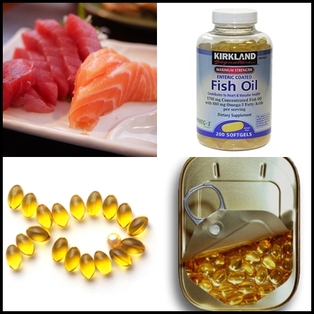Creating Brighter Minds with Fish Oil The fact that fish oil could offer countless amazing benefits to human health is not a surprising thing for most of us. Perhaps we all heard of this omega-3 rich food supplement talked about by people in televisions, radio and on the internet. We often heard of this omega-3 rich food supplement derived from the tissues of certain fish as good for the heart and cardiovascular system. That is quite true. But besides cardiovascular support, there are plenty compelling benefits of fish oil that are usually taken for granted. One of these is the crucial role fish oil plays when it comes to promoting mental health and improving brain function. You probably remember now the time when you’re mother kept on reminding you to eat fish because it’s good for the brain. Turns out your mother really knows best since fish oil has just been confirmed by scientists as an effective deterrent against Alzheimer’s disease as well as bipolar disorder. Extensive studies and researches have been conducted to prove the efficacy of fish oil supplementation in combating mental disorders and enhancing cognitive abilities. This blog is dedicated to everyone who values his or her mental health, to intelligent men and women who wants to be smarter, and to those who want their kids or future children to have brighter minds. Check out the benefits of fish oil on mental health, and how it helps our minds become brighter.
 According to experts and scientists, the best sources of omega 3 fatty acids aren’t supplements but natural fish oil from salmon, tuna, mackeral and other omega-3 rich foods such as walnuts, flaxseeds, eggs and vegetable oil. Consuming these foods is an effective way to absorb omega 3’s and other nutrients as well. When it comes to DHA (docosahexaenoic acid), the type of omega 3 which have several roles in brain health, the best sources would be fish oil, fish and marine foods. So here’s a good recipe that uses fresh salmon and other savory ingredients. Curried salmon cakes are what you will get from this recipe. Easy, tasty and healthy! These salmon cakes, for sure, are a rich source of Omega 3 DHA, the great brain enhancer. The vegetable oil used in frying these cakes is also rich in omega 3 fatty acids. Serve this for your kids’ lunch or breakfast or before they go to school and then get ready to receive their “A”s from spelling tests and school work. Ingredients:
Procedure:
In a microwave-safe bowl, toss in salmon, 1 tablespoon water, 1 1/2 teaspoons curry powder, 1/2 teaspoon salt, and pepper to taste. Give a thorough stir to combine. Cover with plastic wrap and then microwave for 2 to 3 minutes or until the fish appears opaque. Take out the microwave bowl and then use a fork to shred salmons. Set aside to cool a little. Add the following into the salmon: 1 tablespoon tartar sauce, the cracker meal, ginger, half of the scallions and the egg. Mix well. Shape into 4 rounded cakes and keep in the fridge for about 10 minutes, or until firm. While waiting for the salmon to freeze, grab a bowl and stir together the remaining 7 tablespoons tartar sauce and 1/2 teaspoon curry powder. In another bowl, stir in 1 tablespoon of the curried tartar sauce along with bell pepper, celery, mango, remaining scallions, lime juice, 1/4 teaspoon salt, and pepper. In a nonstick skillet placed over medium heat, pour in 1/4 inch of vegetable oil to heat. Before frying the cakes, roll them in cracker meal to coat both sides. Fry cakes until golden for 2 to 3 minutes each side. Take out from skillet and drain on paper towels. Serve with curried tartar sauce and next to mango salad. The Amazing Benefits of Fish Oil to Mental Health  Fish oil is a substance found in the bodies of several species of fish. It is derived specifically from the livers of tuna, salmon, mackerel, etc., and then processed so that humans can use it in the forms of capsules, tablets liquids and powder. You can blame most of fish oil’s health benefits to its high concentrations of omega-3 fatty acids, essential fatty acids that are needed by virtually all organs in the body to function to the optimum level. Omega-3 fatty acids in fish oil are the eicosapentaenoic acid (EPA), and docosahexaenoic acid (DHA), which are thought to play significant roles in combating inflammation and offer countless health benefits, including promoting and enhancing mental health.  Reduces Our Risks to Depression and Suicide.Recent studies published in the years 2004 and 2009 have reported that EPA in fish oil may reduce the risks to depression as well as suicide. One study examined blood samples of 100 suicide-attempts patients and compared the results to the control group's blood samples. They found significant reduced levels of EPA in the red blood cells of patients who had attempted suicide. This relationship may mean that supplementation with EPA through fish oil might enhance our moods, reduce our risks to depression, and eventually our risks to suicide. Another study on the relationship of bipolar disorder and sea food consumption has suggested that the rates of depression in different countries are inversely related to the average person's sea food consumption per year. In countries where sea food consumption is high, there’s a lesser rate of depression. Reduces the Incidence of Bipolar Disorder.Among the two essential fatty acids in fish oil, EPA is more likely to play several roles in stabilizing mental health. Two studies published in the years 1996 and 2003 discovered that the incidence of bipolar disorder as well as the rate of depression have an inverse correlation to seafood consumption in different countries, which means the more seafood consumption there is in a country, the less bipolar disorder. In Japan, the average person eats 150 pounds of sea food per year and it turns out that the country’s rate of depression is 60 times lower than in New Zealand, where the average person consumes only 40 pounds of sea food per year. Stabilize Mood in Bipolar Disorder. In 1999, a study in Harvard University discovered that people with bipolar disorder who were taking fish oil have a significant reduction in their manic and depressive episodes.  Delays and Prevent Alzheimer’s disease. Fish oil has been used by many people as a weapon to delay and prevent the degenerative Alzheimer’s disease. UCLA scientists have confirmed that fish oil is indeed effective in combating Alzheimer’s, and they have found the reasons behind this. Docosahexaenoic acid (DHA) in fish oil appears to be the key component behind this amazing benefit. UCLA scientists have found out that DHA increases the release of a specific protein called LR11, which could destroy the protein that promotes the formation of “toxic plaques” in Alzheimer’s disease. Low levels of LR11 were found in Alzheimer’s patients, and these were believed to be a predisposing factor of the disease. DHA, even in low doses have been found to increase the levels of LR11 in rat neurons. Human neuronal cell cultures have also shown abundant LR11 with high levels of DHA, which seemingly protects the brain cells against Alzheimer’s disease. On the other hand, scientists found that low levels of LR11 resulted in the formation of amyloid plaques in neurons. Creates Intelligent Babies. During pregnancy, both essential fatty acids, DHA and EPA, are involved in the fetus’ brain development. DHA, specifically, accumulates in the fetus’ brain during cortical expansion and maturation. Low levels of the fetus’ cortical DHA during pregnancy are associated with preterm labor, ADHD, and schizophrenia. Recent studies conducted in England also found that children with a daily DHA supplement have a significant increase in their hand-eye coordination, along with improvements in comprehension and verbal skills. Promotes Cognitive Functions. Fish oil intake has long been proven to improve the brain’s cognitive functions such as memory, reasoning and focus. Taking fish oil helps us to think clearer, focus better, recall memories, and reason more logically. A Healthy and brighter mind definitely leads to a better and happier life.
More about Fish oil's Omega 3 fatty acids and mental healthSeems like fish oil have no limits in promoting mental health. Their positive effects are not only limited to Alzheimer's disease, bipolar disorders, ADHD and depression. Learn from medical professional, Dr. David Clark, how omega 3 fatty acids in fish oil positively affects other psychiatric illnesses such as Multiple sclerosis, Parkinson's as well as delusional and disorganized thinking seen in schizophrenia. More studies on omega 3 fatty acids are discussed by Dr. Clark in this video. Learn more about the powerful effects of omega-3 in our brains. In this video, Dr. Pariss Kid, who recently completed his major study about DHA and EPA and their importance in our body systems, reveals the most significant functions of omega-3 fatty acids in the body. He explains in detail why we need omega-3 fatty acids from the moment of conception all the way through old age. He explains why these essential fatty acids are an indispensable substance, particularly when it comes to brain development and maintenance of brain health. It's always good to learn and hear straight from medical professionals the scientifically proven effects of omega 3 fatty acids to our health.
|
|
|



 RSS Feed
RSS Feed